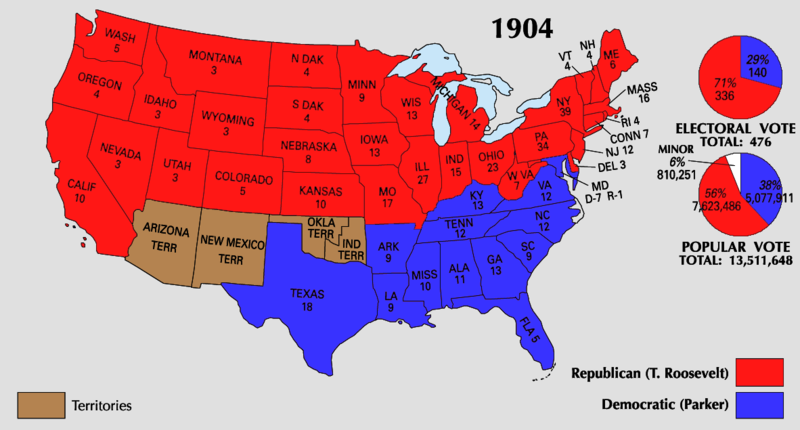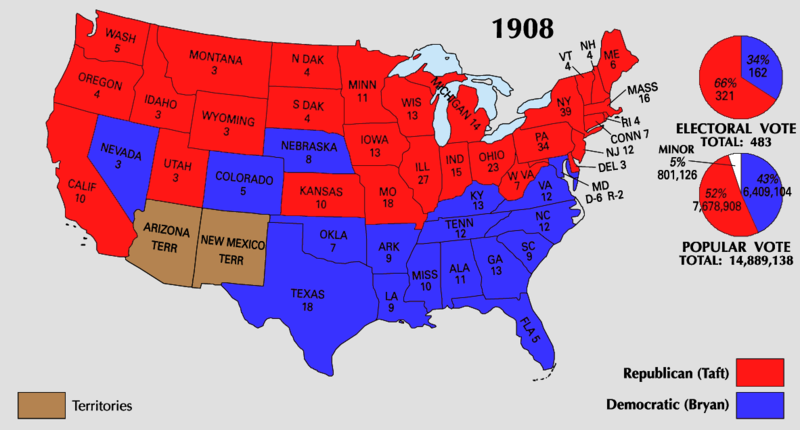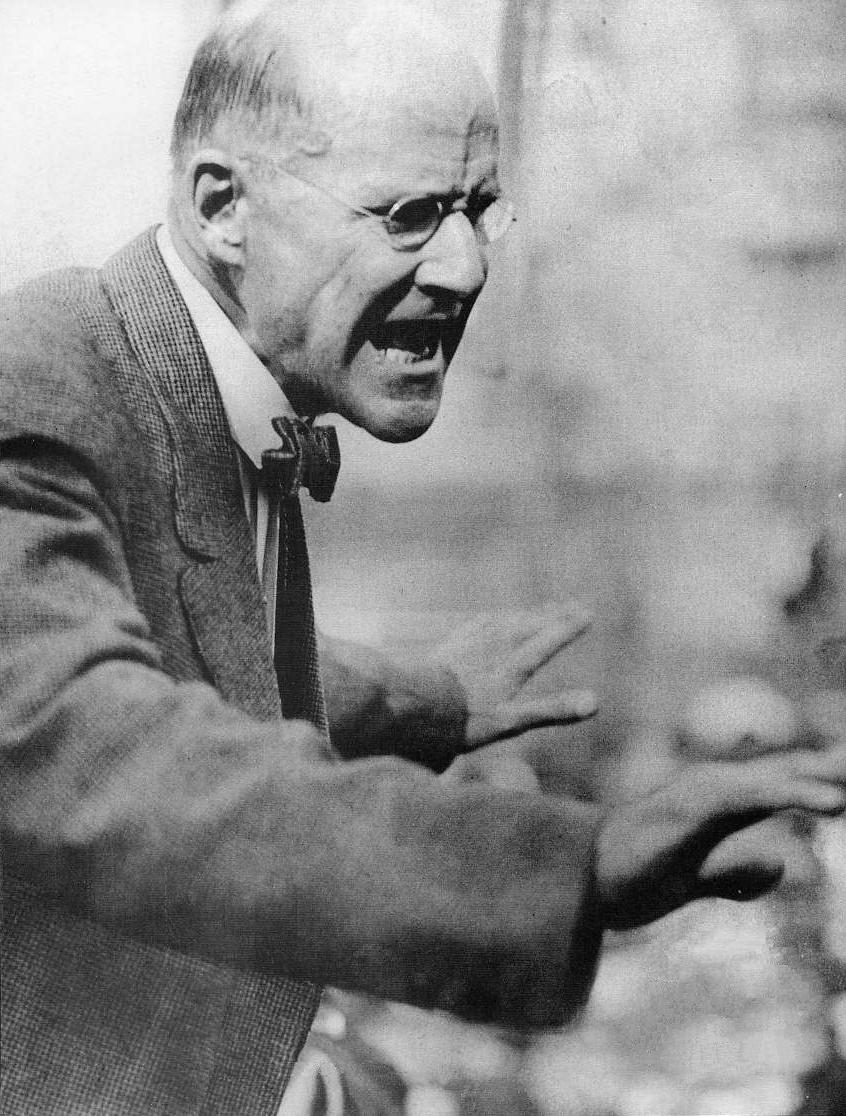12. AMERICAN PROGRESSIVISM

KEY PROGRESSIVISTS: ROOSEVELT AND TAFT
 Theodore ("Teddy") Roosevelt
Theodore ("Teddy") Roosevelt(1858-1919)
 William Howard Taft (1857-1930)
William Howard Taft (1857-1930)
The textual material on this webpage is drawn directly from my work
America – The Covenant Nation © 2021, Volume One, pages 377-386.
THEODORE "TEDDY" ROOSEVELT (1858-1919) |
|
From asthmatic to sportsman
From his birth in 1858, he grew up in an environment of social privilege, a New York City Roosevelt of a long line of successful Roosevelt businessmen. But young Teddy suffered badly from asthma, which, though nearly killing him, did not keep him from being a most energetic and inquisitive youth. He had a keen interest in biology, plus history, French, German and geography (he was home-schooled but also highly self-taught), resulting greatly from the trips he took abroad with his family to Europe and the Middle East. Also, climbing the Alps with his father, he learned the importance of exercise in fighting the asthma and in rebuilding his body. He eventually even took up boxing. Studies, and his first steps into politics
He went on to study the standard curricula at Harvard, excelling in science and philosophy with his nearly photographic memory. The study of military history also focused much of his attention, as did also boxing and rowing. He was inducted into the prestigious Porcellian Club, was editor of the Harvard Advocate, and graduated Phi Beta Kappa and magna cum laude in 1880. He then went off to Columbia Law school, but found his heart to lie not in law books but in the practical field of politics, becoming active in the local Republican organization. At about the same time (1882) he published research he had undertaken at Harvard on the War of 1812, still even today one of the best studies of that war in print. In the same year he became a member of the New York State Assembly. Tragedy
But tragedy as well as stunning accomplishments followed his life. His father had died in 1878 during his second year at Harvard, leaving him deeply stunned. He married four years later in 1882 at age twenty-two, but his wife died two years later in delivering their first child, Alice. Furthermore, his mother had just died in the same house … only eleven hours earlier. Anti-corruption Progressivist
In deep shock, Roosevelt buried himself in his work, investigating governmental corruption in New York City and taking aim at individuals such as the scheming financier Jay Gould and at corruption both in the Albany capital itself and on the judicial bench. And as chairman of the Committee on Affairs of Cities he was a prolific drafter of reformist legislation. He also in 1882 joined the New York National Guard as a second lieutenant, moving up the ranks to captain, gaining military experience that he would put to use later when the Spanish-American War broke out in 1898. In 1884 he reached higher in Republican politics, gaining chairmanship of the New York Republican Party delegates sent to the national convention that year, over the opposition of Blaine and Arthur. But in the end, he reluctantly agreed to support the Party's ultimate nominee, Blaine. And in the process, he was called upon to deliver a speech before ten thousand delegates, bringing him into the national political spotlight. Blaine went on to lose the election to Cleveland, and Roosevelt retired to his ranch out West in the Dakotas along the Little Missouri River. Shortly after that (1886), as the "Dakota Cowboy," he ran an unsuccessful race for New York City mayor. But that December he finally found success in marrying in London his second wife, Edith, who would deliver five strong children! In 1888 he returned to public life campaigning for Benjamin Harrison, who in becoming president appointed him to the Civil Service Commission, on which Roosevelt served for the next seven years in Washington, D.C. The purpose of the Commission was to counter the spoils system, and Roosevelt proved himself to be a strong enforcer of that policy. This again brought him much favorable public attention. New York City police commissioner
In 1894 he declined the offer of New York
Republicans to run again for the office of mayor, and then soon
regretted the decision. He retreated to the Dakotas again to think
things through, and then quickly accepted the offer to become a member
of New York City's Board of Police Commissioners. Here his strong will
to clean up urban political corruption virtually remade the New York
City police, Roosevelt even going out on his own to inspect officers on
the beat, but also noting along the way the deplorable state of the
city's poor. Eventually his rigor drew the wrath of New York's Tammany
Hall and its Boss Platt, Platt finally taking action to have the Board
of Police Commissioners eliminated. Assistant secretary of the navy
Then in 1897, Roosevelt’s friend Henry Cabot Lodge promoted the appointment of Roosevelt to McKinley’s cabinet as assistant secretary of the navy. It was a very logical appointment, given Roosevelt’s proven knowledge and interest in all matters concerning the Navy.1 With a sickly secretary of the navy as his boss, Roosevelt soon found himself conducting most of the affairs of the navy secretary, including advising McKinley on naval matters, particularly as war with Spain loomed into view. He even took over the preparations for naval war after the blowing up of the battleship Maine in the harbor of Havana, Cuba. The Spanish-American War and Roosevelt's "Rough Riders"
War against Spain was declared on April 25th (1898) and Roosevelt then resigned his cabinet position soon thereafter to take himself to Texas to form, finance, and train his own cavalry regiment, popularly known as the "Rough Riders." A month later this strange array of adventure-seeking young men (ranging from Ivy Leaguers and Eastern gentlemen, to miners, hunters, cowboys and even Indians) shipped off to Cuba. After some minor experience in battle, in June they were directed to act in support of a massive but dangerous charge of American troops uphill across open ground defended by Spanish regulars armed with the latest weaponry, including machine guns and repeating rifles. However, the American machine guns (Gatling guns) poured such fire onto the Spanish during the charge that the Spanish failed to offer effective resistance. Of course the attack involved thousands of other American troops besides the Rough Riders (the Rough Riders actually charged nearby Kettle Hill while the rest of the Americans charged San Juan Hill). This attacking party included numerous Buffalo Soldiers (American Blacks). The latter did much of the heavy fighting, but (of course) received little if any recognition for their effort.2 Actually, the action had cost the Americans dearly: 200 killed and 1,000 wounded, about five Americans for every Spanish soldier suffering the same fate. But the Spanish were put on the run and Santiago was captured two weeks later, virtually ending the war. Colonel Roosevelt was careful to narrate to an adoring press the adventures of his Rough Riders in a way that complemented the other troops, but clearly left the focus on his own troops. As a result, he came out of the action a national hero. He would also remember this event as the very best moment in his life. New York Governor
So well-known was his name at this point that he was asked to run for the position of New York Governor in 1898, which he won in a very tight race. As New York Governor he was immersed in the kinds of larger political issues tha t would prepare him well for higher office (such as U.S. president). He had corruption to clean out, monopolies and trusts to hem in, labor problems to resolve, and, close to his heart, the conservation of New York’s extensive woodlands and rivers to embrace. And he leaned on wealthy businesses to give financial support (taxes) to the New York community that so prospered these businesses. His program he summed up as the "Square Deal" (sounding a lot like his nephew Franklin Roosevelt’s term "New Deal" of some 30 years later). In all this he skillfully led Boss Platt to become an actual supporter of his policies, thus helping Roosevelt get his ideas actually put into play. That was political diplomacy at its finest. The 1900 election
It was this political skill (plus again some intervention by his friend Henry Cabot Lodge) that brought him to the attention of many political figures, both positively and negatively. Both his friends and his enemies saw his selection as vice president as an opportunity ... to march him toward the White House (his friends) and get him out of New York (his enemies). With no one else being put forward for the thankless job of vice president, Roosevelt was nominated as McKinley's new running mate in the 1900 election. It would be a fateful choice. Vice president
Roosevelt campaigned hard for the Republican Party (he loved the challenge dearly), the Party once again running against the equally tireless Democratic Party candidate, Bryan. That November the Republicans delivered an even bigger blow to the Democrat Bryan than before. And Roosevelt stepped into the quite powerless job of vice president. Roosevelt would discover during this time how much he disliked being out of the real action. President
With McKinley's assassination six months into his second term in office (September), Roosevelt stepped up to the office of U.S. president. In some ways he continued McKinley's political program (pro-gold, high tariffs and imperialism) and in other ways he went well beyond McKinley in the way he went after the big trusts that dominated American business, and the way he supported American labor. He faced a huge strike of American coal miners, threatening to send federal troops to break the strike, yet being willing to set up a commission to arbitrate the dispute – which ended in a compromise acceptable to both sides. A Square Deal had been struck. He also backed federal regulation of railroad rates (the 1906 Hepburn Act) to neutralize the monopolistic effect of the industry (only one railroad running through town charging whatever prices it wanted, there being no alternative). The Pure Food and Drug Act was passed also in 1906 (along with other legislation supervising the health of the food and pharmaceutical industries). And being the lover of the woods, fields, streams and mountains of America – and the animals living there – he was particularly active in using federal power to protect undeveloped lands, transforming them into national parks, national forests and game preserves. The Election of 1904
Roosevelt easily won reelection to a second term in 1904, but made the fateful declaration at that time that this would be his last term in office (but serving only two terms was something of a long-standing presidential tradition anyway). It would be a declaration that later he would regret, which he would go back on, producing disastrous unintended consequences, at least for his Republican Party (and, depending on how a person feels about Woodrow Wilson as president, perhaps for the nation). Roosevelt's second term in office
Roosevelt pushed his assault on the wealthy, calling for a national income tax, although the Supreme Court had already ruled that the Constitution allowed for no such tax, which would be permissible only through the passing of a constitutional amendment (which eventually occurred, but not until 1913). He also attempted to reach federal authority into other walks of American life, finding the way blocked again by the fact that there was little or no constitutional warrant for doing so, no matter how noble the cause. He did, however, see through to success the 1907 Tillman Act outlawing corporate contributions to federal political campaigns, a significant step forward (not always respected however) restricting big money manipulation of national elections.3 The Panic of 1907
Once again panic hit Wall Street when a greedy scheme to buy out the stock of huge United Copper Company instead collapsed the value of the company's stock, causing people to withdraw deposits with banks invested in the company. This in turn spread quickly into a general banking and Wall Street scare, forcing bankruptcy on numerous state and local banks, including New York banks holding the reserves of these regional banks. It also dropped overall stock values on Wall Street to half of what they were the previous year. Finally, when the huge Knickerbocker Trust Company collapsed, J.P. Morgan – under an agreement with Roosevelt – stepped in to help buy out failing companies and restore investor confidence in Wall Street. Morgan's U.S. Steel Company also bought out the Tennessee Coal, Iron and Railroad Company (TCIR) just as it too was about to collapse (also under agreement with Roosevelt). Thus it was that during his last years in office the strongly anti-monopolist Roosevelt had to turn to one of his targeted monopolies for help! 1Roosevelt, along with many others, including European heads of state, had been strongly influenced by the 1890 publication by Alfred Thayer Mahan, The Influence of Sea Power upon History, 1660-1783. 2Lieutenant Ord, who lost his life in the attack, and his Buffalo Soldiers, who actually reached the heights of San Juan Hill first, were largely overlooked when honors were being passed around. 3Those restrictions would even be strengthened by follow-up legislation, until 2010 and then also in 2014, when in two separate decisions, the Supreme Court ruled that any restriction in the right to contribute to political campaigns is unconstitutional. 
Library of Congress   
 
Department of the Interior   
  "I have no idea what the American people think. I only know what they should think."  
 
|


















